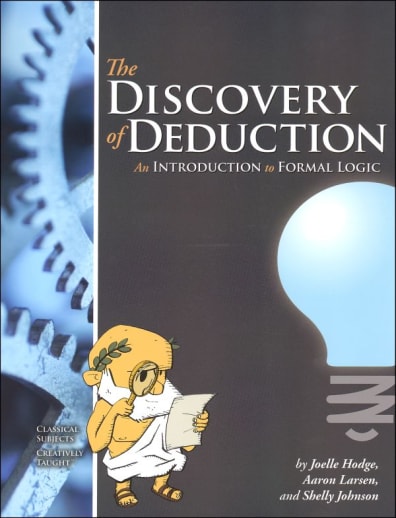- Bargain Items are brand-new products that have been dinged, dented, or scuffed, but are otherwise in usable condition.
- Bargain Items have limited inventory, and they are only reserved for you when checkout is completed.
- Bargain Items are non-returnable and non-refundable.
Discovery of Deduction
Description
The Discovery of Deduction: An Introduction to Formal Logic will welcome your students into the fascinating realm of formal, deductive logic. This text teaches students how an argument is put together—the form or structure of an argument. It pulls back the curtain to show students not only how arguments work, but also how to assess what's going on in their own minds. The Discovery of Deduction is recommended for students who have studied informal fallacies, such as those taught in The Art of Argument: An Introduction to the Informal Fallacies; however, the text does also stand on its own as an independent study of formal logic.
The Discovery of Deduction (Student Edition)
makes a subject usually reserved for study in college accessible and relevant to logic-stage students, who are at an age when they are beginning to engage with important ideas. This text emphasizes the practical and real-world application of soundly structured deductive logic. Using methods such as Socratic dialogue, ample discussion, and integration of other subjects, the text approaches formal logic in the ideal way for dialectic students. Starting with a short history of Aristotelian logic, students move from there to learning how to translate arguments from ordinary, conversational, or written narratives into categorical form. Students then build on those skills as they study how to construct syllogisms and test them for validity. As a part of this process, they study the square of opposition and relationships of equivalence, learning how to make valid propositional inferences and analyze syllogisms.This is a consumable item.
The "let's get down to formal logic" book in the series, looking at reasoning in the abstract and focusing primarily on deductive reasoning. Through Socratic dialogue, definitional distinctions, and a sort of discussion/response format, the student is led through the study which includes a history of logic, propositions and their relationships, categorical syllogisms, and ends with terms and definitions. Appendices include Venn diagrams of syllogisms as well as an essay on handling religious, moral, and ethical disputes. Both Student and TE include Endnotes and Glossary, and Bibliography. 324 pgs. pb
| Product Format: | Softcover Book |
|---|---|
| Grades: | 8-12 |
| Brand: | Classical Academic Press |
| ISBN: | 9781600510335 |
| Length in Inches: | 10.75 |
| Width in Inches: | 8.5 |
| Height in Inches: | 0.875 |
| Weight in Pounds: | 2.07 |


